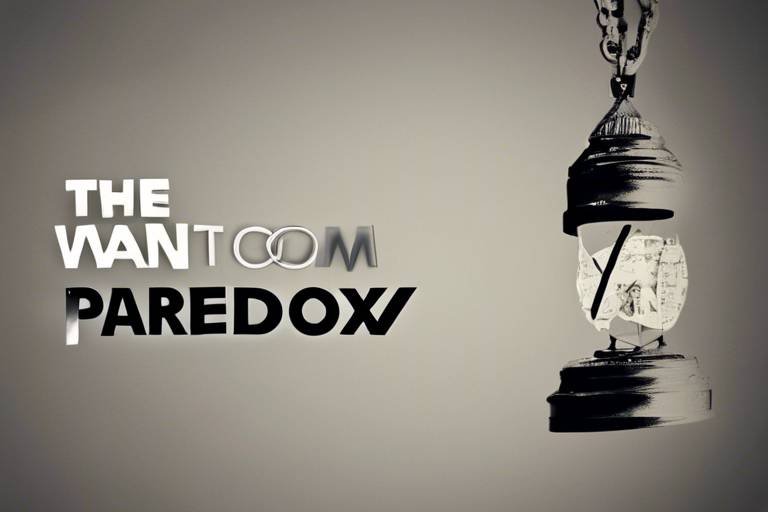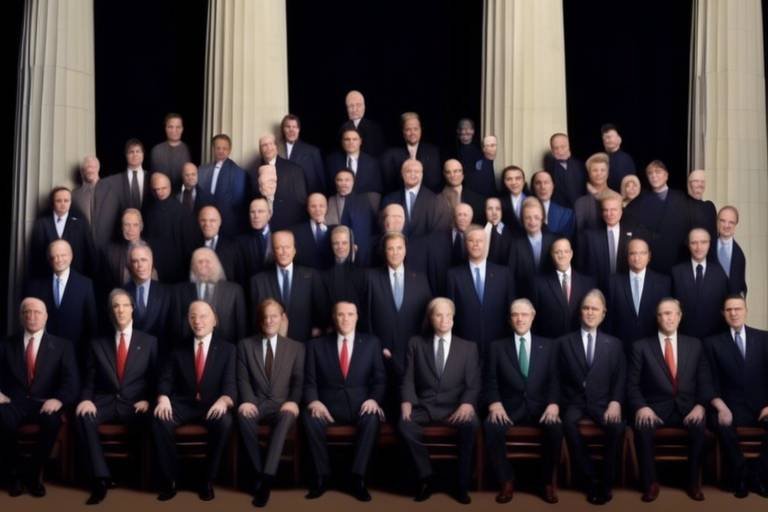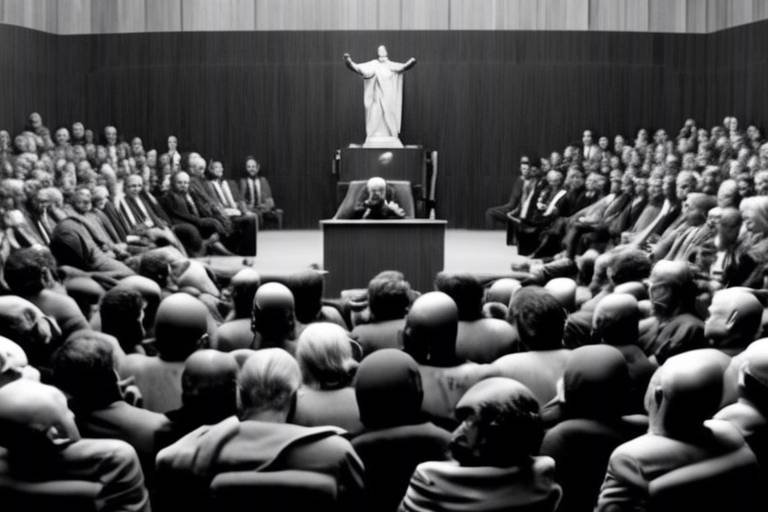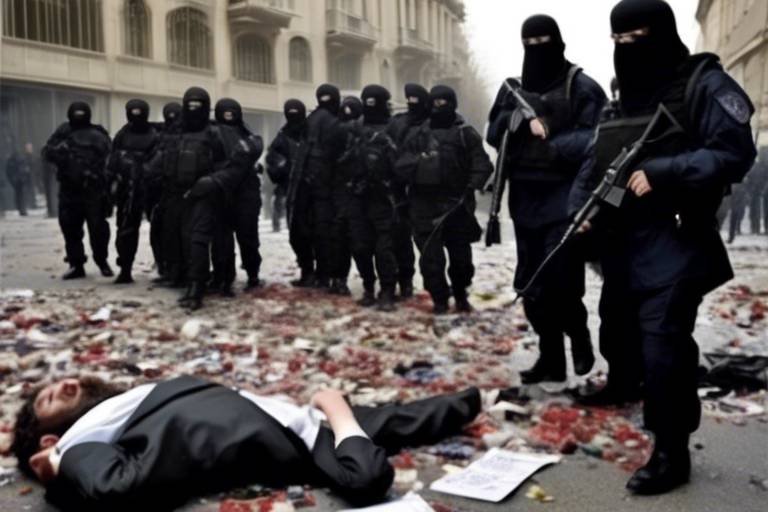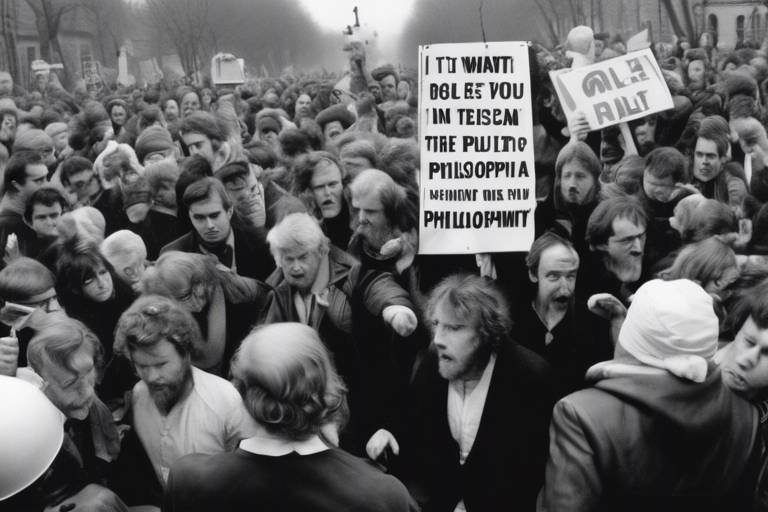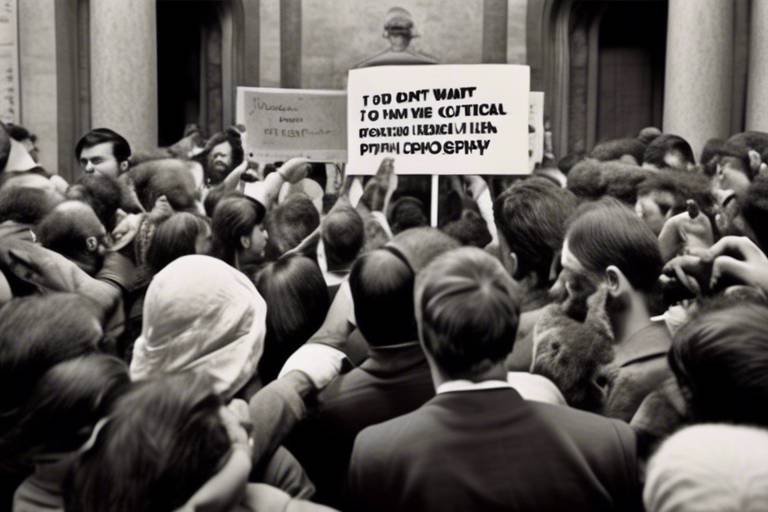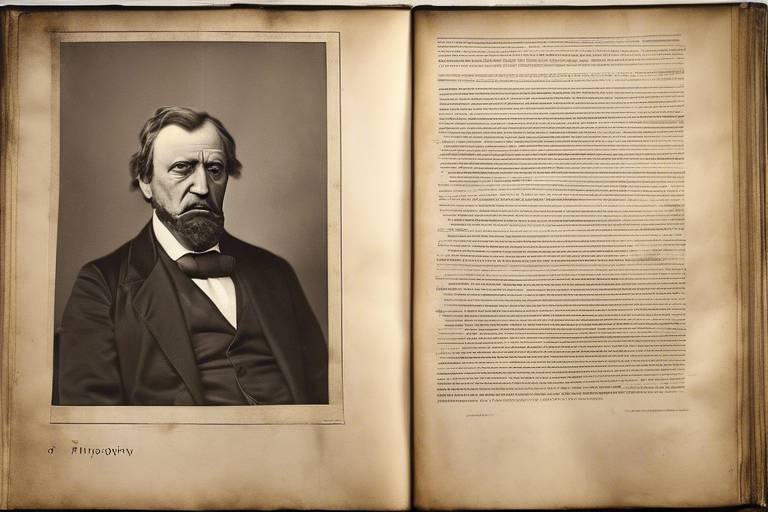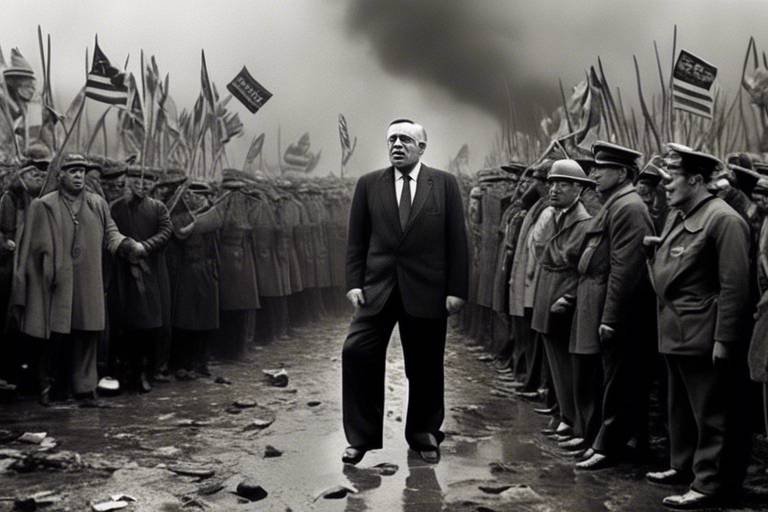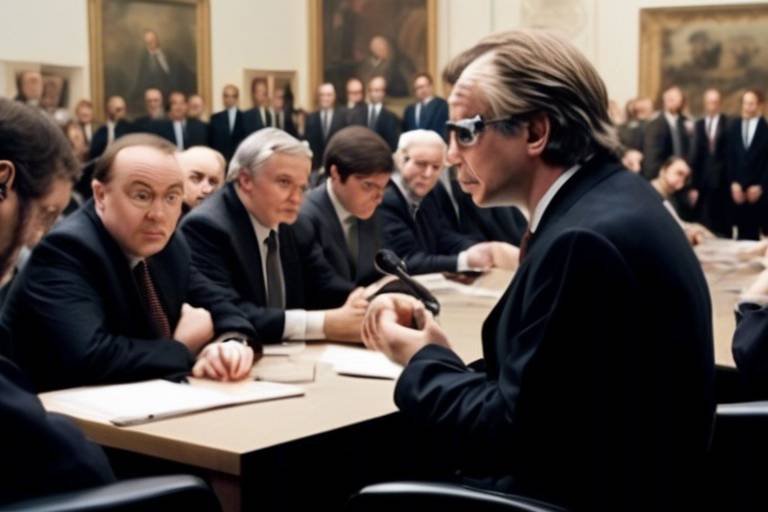The Freedom Paradox – A Twist in Political Philosophy
Have you ever felt torn between your desire for personal freedom and the need for social order? This internal conflict is at the heart of what we call the freedom paradox. It’s a fascinating twist in the realm of political philosophy that compels us to question how we define freedom and what it truly means to be free. At first glance, freedom might seem like a straightforward concept—after all, who doesn’t want to be free? However, as we dive deeper into the intricate layers of this idea, we discover that freedom is anything but simple.
Imagine a world where everyone is free to do as they please. Sounds ideal, right? But consider the implications: if one person’s freedom infringes on another’s, where do we draw the line? This paradox highlights the tension between individual liberty and societal constraints. In political philosophy, this tension has sparked debates that have shaped our understanding of governance, rights, and responsibilities. The freedom paradox serves as a lens through which we can examine these complex relationships, revealing the contradictions that arise when personal desires collide with collective needs.
As we embark on this exploration, we will uncover how historical thinkers like John Locke and Jean-Jacques Rousseau approached the concept of freedom, laying the groundwork for modern political ideologies. Their contrasting views illuminate the ongoing discourse surrounding freedom, highlighting both its allure and its potential pitfalls. Ultimately, the freedom paradox invites us to reflect on our own beliefs and assumptions about what it means to be free in a world filled with competing interests and values.
So, what does it mean to be truly free? Is it the absence of constraints, or is it the ability to engage meaningfully with others in society? As we navigate through the complexities of freedom, we will also consider how contemporary movements grapple with these questions, advocating for rights while acknowledging the necessity of social responsibility. It’s a delicate balance, and one that continues to evolve as our understanding of freedom deepens.
- What is the freedom paradox? The freedom paradox refers to the conflict between individual liberty and societal constraints, highlighting the complexities of defining freedom.
- Who are key thinkers in the discussion of freedom? Key thinkers include John Locke, who advocated for individual rights, and Jean-Jacques Rousseau, who emphasized the importance of the collective will.
- How does modern society grapple with freedom? Contemporary movements advocate for freedom while navigating issues of social justice and equality, often facing the challenge of balancing individual rights with community obligations.

The Concept of Freedom
Understanding the concept of freedom is like peeling an onion; each layer reveals a deeper complexity that can make one tear up with confusion or enlightenment. At its core, freedom is often perceived as the absence of constraints, but this simplistic view barely scratches the surface. To truly grasp the implications of freedom in political philosophy, we must explore its various definitions, particularly the distinctions between negative and positive freedom.
Negative freedom, often referred to as "freedom from," emphasizes the idea that individuals should be free from interference by others, especially the state. Imagine standing on a beach, the waves of the ocean crashing around you, and you feel completely unshackled. That’s negative freedom in action; it’s about the absence of obstacles that would prevent you from doing what you want. This perspective aligns closely with classical liberalism, where the focus is on individual rights and liberties. The less the government intervenes in our lives, the more freedom we possess.
On the flip side, we have positive freedom, or "freedom to." This concept argues that true freedom is not merely about the absence of constraints but rather the presence of opportunities to fulfill one’s potential. Picture a bird in a cage; yes, it might be free from predators, but it is not truly free until it can soar through the skies. Positive freedom emphasizes the need for enabling conditions—like education, healthcare, and economic stability—that allow individuals to achieve their goals and aspirations. It raises the question: can one be truly free if they lack the means to exercise their freedoms?
The tension between these two forms of freedom is not just academic; it plays a significant role in contemporary debates on social justice, equality, and government policy. For instance, proponents of positive freedom might argue that without social programs, marginalized communities are effectively denied their freedom, even if the law does not actively restrict them. Conversely, advocates of negative freedom might contend that too much government intervention stifles individual initiative and responsibility.
Understanding these distinctions is crucial as we navigate the intricate landscape of political philosophy. Are we more concerned about the absence of constraints, or are we focused on ensuring that everyone has the resources to pursue their own version of happiness? This debate is not merely theoretical; it has real-world implications that can shape policies and influence the direction of societies.
As we delve deeper into the historical perspectives on freedom, we will see how thinkers like John Locke and Jean-Jacques Rousseau grappled with these very questions. Their ideas have laid the groundwork for modern political ideologies, influencing how we perceive freedom today. Ultimately, the concept of freedom is not a monolith; it is a dynamic interplay of individual desires and societal obligations, constantly evolving as our understanding of what it means to be free develops.

Historical Perspectives on Freedom
When we dive into the historical perspectives on freedom, we find ourselves navigating a fascinating landscape shaped by some of the greatest thinkers of all time. Figures like John Locke and Jean-Jacques Rousseau have left indelible marks on our understanding of what freedom truly means. Their ideas not only influenced their contemporaries but also laid the groundwork for modern political ideologies that continue to shape our world today. So, what did these thinkers really say about freedom, and how do their contrasting views inform our current debates?
Locke, often hailed as the father of liberalism, introduced the concept of natural rights, which posits that individuals are entitled to certain inalienable rights simply by being human. He argued that life, liberty, and property are fundamental rights that governments must protect. According to Locke, the legitimacy of a government hinges on the consent of the governed, which means that people have the right to overthrow a government that fails to uphold their freedoms. This revolutionary idea not only challenged the divine right of kings but also sparked movements that led to democratic governance across the globe.
On the flip side, we have Rousseau, whose views on freedom are encapsulated in his famous social contract theory. Unlike Locke, Rousseau believed that true freedom is found not in individualism but in collective will. He argued that individuals achieve their fullest potential not by pursuing personal interests in isolation but by participating in a community that prioritizes the common good. This perspective raises intriguing questions: Can we be truly free if our freedom is contingent upon societal obligations? Rousseau's work challenges us to consider how our personal liberties must sometimes bend to the will of the community.
These historical perspectives reveal a profound tension between individual liberty and societal responsibility. While Locke champions the rights of the individual, Rousseau reminds us that we are part of something larger than ourselves. This duality creates a rich tapestry of ideas that informs contemporary debates about freedom. For instance, consider the modern discussions surrounding social justice: Are we truly free if systemic inequalities inhibit certain groups from enjoying the same liberties as others? This question echoes the sentiments of both Locke and Rousseau, as it highlights the ongoing struggle to balance personal freedoms with the needs of society.
To further illustrate these contrasting perspectives, let’s take a look at the following table that summarizes the key differences between Locke's and Rousseau's views on freedom:
| Aspect | John Locke | Jean-Jacques Rousseau |
|---|---|---|
| Definition of Freedom | Individual liberty and natural rights | Collective will and societal obligations |
| Source of Legitimacy | Consent of the governed | General will of the people |
| View on Government | Protector of individual rights | Agent of the collective good |
| Role of Society | Facilitator of individual freedom | Shaper of collective identity |
As we reflect on these historical perspectives, it's clear that the discourse on freedom is anything but straightforward. The ideas of Locke and Rousseau continue to resonate in today’s political climate, where the quest for personal liberties often collides with the necessity of social responsibility. Understanding these foundational theories helps us navigate the complexities of freedom in our modern world, reminding us that the fight for liberty is as relevant now as it was in the past.
- What is the main difference between negative and positive freedom? Negative freedom refers to freedom from interference, while positive freedom emphasizes the ability to achieve one's potential through societal support.
- How did John Locke influence modern democracy? Locke's ideas about natural rights and government by consent laid the groundwork for democratic principles that prioritize individual liberties.
- What is Rousseau's concept of the social contract? Rousseau's social contract posits that individuals achieve true freedom by participating in a community that prioritizes the common good over individual interests.
- Why is the tension between individual freedom and societal responsibility important? This tension highlights the ongoing struggle to balance personal liberties with the needs of society, a debate that remains relevant in contemporary discussions about social justice.

Locke's Liberalism
John Locke, often hailed as the father of liberalism, profoundly shaped our understanding of individual liberty and the role of government. His theories on natural rights assert that every person is entitled to certain inalienable rights, notably life, liberty, and property. Locke believed that the primary purpose of government is to protect these rights, and any government that fails to do so forfeits its legitimacy. This idea resonates strongly in contemporary democratic societies, where the protection of individual freedoms is paramount.
Locke's vision of a social contract is particularly intriguing. Unlike Hobbes, who viewed the social contract as a mechanism for surrendering personal freedoms to an authoritarian ruler, Locke argued that individuals consent to form governments to safeguard their rights. In this light, the government is a servant of the people, not their master. This revolutionary notion laid the groundwork for modern democratic thought, emphasizing that authority derives from the consent of the governed.
Moreover, Locke's liberalism introduces the concept of toleration. He strongly advocated for religious freedom and the separation of church and state, arguing that belief is a personal matter and should not be dictated by government. This idea not only promotes individual liberty but also fosters a pluralistic society where diverse beliefs can coexist. In Locke's view, a society thrives when individuals are free to express their thoughts and beliefs without fear of persecution.
However, while Locke's theories champion individual liberty, they also raise important questions about the limits of freedom. For example, if everyone is free to pursue their own interests, how do we ensure that one person's liberty does not infringe upon another's? This dilemma is at the heart of ongoing debates about the balance between personal freedoms and social responsibilities. Locke himself acknowledged this tension, suggesting that individuals have a duty to respect the rights of others, which is crucial for maintaining a just society.
In summary, Locke's liberalism not only championed individual rights but also provided a framework for understanding the relationship between freedom and governance. His ideas continue to influence political discourse today, as societies grapple with the complexities of liberty and authority. As we navigate modern challenges, reflecting on Locke's principles can offer valuable insights into the ongoing quest for a balance between personal freedom and the collective good.

Rousseau's Social Contract
Jean-Jacques Rousseau's idea of the social contract is a cornerstone of modern political philosophy, presenting a compelling challenge to the traditional notions of individual freedom. In his seminal work, "The Social Contract," Rousseau posits that true freedom is not merely about the absence of constraints but is deeply intertwined with the collective will of the people. He famously states, "Man is born free, and everywhere he is in chains," highlighting the paradox of individual liberty in a structured society. This paradox invites us to ponder: can one truly be free while living within the confines of societal rules?
Rousseau's social contract theory suggests that individuals willingly surrender some of their freedoms to gain the protection and benefits of a collective society. This surrender is not a loss but a transformation of freedom into a more profound, communal liberty. He argues that by participating in the formation of the general will, individuals achieve a form of freedom that is more fulfilling than mere personal autonomy. In this sense, Rousseau reconciles the tension between individual liberty and societal obligations, suggesting that the latter can enhance the former.
One of the key elements of Rousseau's philosophy is the idea of the general will, which represents the collective interests of the people. He asserts that the general will should guide the laws of the state, ensuring that they reflect the common good rather than the interests of a privileged few. This concept raises important questions about how we define freedom in a democratic society. If freedom is tied to the collective will, does that mean individual desires must sometimes be sacrificed for the greater good? Rousseau’s perspective invites us to consider the balance between personal desires and the responsibilities we owe to each other as members of a community.
Furthermore, Rousseau emphasizes the importance of civic engagement and participation in governance. He believes that when individuals actively contribute to the political process, they not only exercise their freedom but also help shape a society that reflects their shared values and aspirations. This notion implies that freedom is not a static state but rather an ongoing process that requires active involvement and commitment from all citizens.
To summarize, Rousseau's social contract challenges us to rethink our understanding of freedom. It compels us to recognize that true liberty is not simply about individual rights but is also about our responsibilities to one another. By embracing the collective will and actively participating in the political landscape, we can forge a society that honors both individual freedoms and the common good. The tension between personal liberty and societal constraints remains a vital discussion, as we navigate the complexities of modern governance and strive for a balance that honors both aspects of our existence.
- What is Rousseau's social contract theory? Rousseau's social contract theory posits that individuals agree to form a society and abide by its rules in exchange for protection and communal benefits, emphasizing the collective will over individual desires.
- How does Rousseau define freedom? Rousseau defines freedom not just as the absence of constraints but as participation in the general will, which fosters a deeper sense of liberty within a community.
- What is the general will? The general will is the collective interest of the people, which Rousseau believes should guide the laws and governance of society, ensuring that they reflect the common good.
- Why is civic engagement important in Rousseau's philosophy? Civic engagement is crucial because it allows individuals to actively participate in shaping their society, thus enhancing their freedom and fulfilling their responsibilities as citizens.

Contradictions in Freedom
When we dive into the concept of freedom, we quickly find ourselves entangled in a web of contradictions. At first glance, freedom seems like a straightforward idea—who wouldn't want to be free? However, as we peel back the layers, we discover that freedom is anything but simple. It can be likened to a double-edged sword; while it offers the promise of individual liberty, it also raises complex questions about the implications of that freedom on society as a whole.
One of the most striking contradictions is the tension between personal liberties and societal norms. For instance, consider the idea of free speech. In a truly free society, individuals should be able to express their thoughts without fear of repercussion. Yet, this freedom can conflict with the need to protect others from hate speech or misinformation. Here lies the paradox: how do we uphold the value of free expression while also ensuring that it does not infringe upon the rights and dignity of others?
Moreover, the concept of freedom can vary significantly based on cultural and societal contexts. In some cultures, individual freedom is celebrated, while in others, community and collective well-being take precedence. This divergence leads to a fundamental question: is freedom a universal right, or is it shaped by the values and beliefs of a particular society? For instance, in a collectivist society, the notion of freedom may be interpreted as the ability to contribute to the common good, rather than the pursuit of individual desires.
This contradiction also extends to the economic realm. The idea of a free market champions the notion of individual choice and competition. However, this pursuit of economic freedom can lead to significant inequalities. As wealth accumulates in the hands of a few, the freedom of the less fortunate is curtailed. Thus, while the market may be 'free,' the reality is that not everyone has equal access to opportunities, leading us to question: can true freedom exist in an unequal society?
To further illustrate these contradictions, let’s examine a few scenarios:
- Freedom of Expression vs. Hate Speech: The right to express oneself can sometimes clash with the responsibility to protect others from harmful rhetoric.
- Individual Rights vs. Collective Responsibility: In times of crisis, such as a pandemic, individual freedoms may be restricted for the greater good, raising questions about the limits of personal liberty.
- Economic Freedom vs. Social Justice: The freedom to pursue wealth can lead to disparities that undermine the freedom of others to thrive.
In essence, the contradictions in freedom challenge our understanding of what it means to be free. As we grapple with these complexities, it becomes clear that freedom is not just a personal pursuit; it is a collective endeavor. The true nature of freedom lies in finding a balance between individual rights and societal obligations, a delicate dance that requires ongoing dialogue and reflection.
- What is the difference between negative and positive freedom? Negative freedom refers to freedom from interference, while positive freedom is about the capacity to act upon one's free will.
- How do historical thinkers influence modern views on freedom? Thinkers like Locke and Rousseau laid the groundwork for contemporary political ideologies, shaping our understanding of rights and responsibilities.
- Can freedom exist without equality? True freedom is difficult to achieve in a society marked by significant inequalities, as disparities can limit opportunities for many.

Modern Implications of Freedom
In today's rapidly evolving political landscape, the concept of freedom has become a focal point of heated debates and discussions. As societies grapple with the challenges of globalization, technology, and social justice, the implications of freedom take on new dimensions. The tension between personal liberties and the collective good is more pronounced than ever, prompting us to ask: what does it truly mean to be free in the 21st century?
One of the most striking aspects of modern freedom is the rise of social movements advocating for various forms of liberty. From the Black Lives Matter movement to the fight for LGBTQ+ rights, these movements highlight the struggle against systemic oppression and the quest for equal rights. They remind us that freedom is not merely the absence of restrictions but also the presence of opportunities and protections for all individuals. In this context, freedom becomes a collective endeavor, emphasizing the interconnectedness of our rights.
Moreover, the advent of technology has revolutionized how we perceive and exercise our freedoms. The internet, while a powerful tool for communication and expression, also raises significant questions about privacy and surveillance. Are we truly free if our online activities are constantly monitored? This paradox illustrates how the digital age complicates our understanding of freedom, as we navigate the balance between connectivity and autonomy.
As we delve deeper into the implications of freedom, we must also consider the economic dimensions. In many societies, economic freedom is touted as a cornerstone of liberty. Yet, this often leads to a stark reality: the gap between the wealthy and the poor continues to widen. Economic inequality can severely limit access to opportunities, education, and basic needs, thereby constraining true freedom for many. Thus, the modern discourse on freedom must encompass not only personal liberties but also the socio-economic factors that influence them.
To further illustrate these complexities, consider the following table that summarizes the various dimensions of freedom in modern society:
| Dimension of Freedom | Description | Challenges |
|---|---|---|
| Personal Liberty | Individual rights to express oneself and make choices. | Surveillance, censorship, and discrimination. |
| Social Justice | Equitable treatment and opportunities for all. | Systemic inequality and oppression. |
| Economic Freedom | Ability to participate in economic activities and make financial choices. | Wealth disparity and limited access to resources. |
| Digital Freedom | Freedom of expression and privacy in the digital realm. | Data privacy concerns and online censorship. |
As we navigate these modern implications of freedom, it’s essential to recognize that our understanding of liberty is constantly evolving. The conversations surrounding freedom must adapt to address the unique challenges of our time. By engaging in these discussions, we can work towards a more inclusive definition of freedom that encompasses the diverse experiences and needs of all individuals in society.
- What is the difference between negative and positive freedom?
Negative freedom refers to the absence of interference from others, while positive freedom emphasizes the presence of opportunities and resources to achieve one's potential. - How do social movements impact the concept of freedom?
Social movements challenge existing norms and advocate for the rights of marginalized groups, thereby expanding the definition of freedom to include social justice and equality. - What role does technology play in modern freedom?
Technology can enhance freedom by providing platforms for expression, but it also poses challenges related to privacy and surveillance, complicating our understanding of autonomy. - How does economic inequality affect freedom?
Economic inequality can limit access to opportunities and resources, thereby constraining the true exercise of freedom for individuals in lower socio-economic strata.

Freedom vs. Authority
The tension between individual freedom and state authority is a central theme in political philosophy that has sparked debates for centuries. Imagine standing at a crossroads, where one path leads to personal liberty and the other to the structured order of governance. This dichotomy raises essential questions: How much freedom should individuals have? At what point does the authority of the state become oppressive? These questions are not merely academic; they resonate deeply in our daily lives, influencing laws, policies, and our interactions with one another.
On one hand, we have the champions of freedom who argue that personal liberties are paramount. They believe that individuals should have the right to make choices about their own lives with minimal interference from the government. This perspective is often associated with libertarianism, which posits that the state should only exist to protect individual rights, leaving as much room as possible for personal autonomy. Libertarians argue that when the government overreaches, it stifles creativity, innovation, and the very essence of what it means to be human. They contend that a society thrives when individuals are free to pursue their own interests, as long as they do not infringe upon the rights of others.
However, this viewpoint is not without its critics. Many argue that complete freedom can lead to chaos and inequality. In this light, state authority becomes necessary to maintain order and protect the common good. Consider the following points:
- Social Responsibility: Without some level of government intervention, vulnerable populations may be left unprotected. This brings us to the question of how we balance individual rights with our moral obligation to care for others.
- Public Safety: The state often imposes restrictions on freedom to ensure the safety and security of its citizens. For example, laws against theft and violence are designed to protect individuals from harm.
- Collective Welfare: In many cases, the authority of the state is justified in the name of the greater good. Policies aimed at environmental protection or public health can restrict individual freedoms but are seen as necessary for the survival of society as a whole.
As we navigate this complex landscape, it becomes clear that the relationship between freedom and authority is not black and white. Different political systems approach this balance in varied ways. In democratic societies, the goal is often to strike a compromise that allows for both individual liberties and the necessary authority to govern effectively. On the contrary, authoritarian regimes tend to prioritize state control, often at the expense of personal freedoms, justifying their actions with promises of stability and security.
Ultimately, the freedom versus authority debate is a reflection of our values as a society. Are we willing to sacrifice some degree of personal liberty for the sake of order and security? Or do we hold the belief that true progress can only be achieved when individuals are free to express themselves and pursue their own paths? This ongoing dialogue is crucial, as it shapes the political landscape and influences the future of governance.
1. What is the main conflict between freedom and authority?
The main conflict lies in the balance between individual liberties and the need for societal order. While freedom advocates for minimal government interference, authority emphasizes the necessity of regulations to maintain public safety and welfare.
2. How do different political systems address this conflict?
Democratic systems typically aim for a balance between freedom and authority, allowing for individual rights while ensuring governance. In contrast, authoritarian regimes often prioritize state control over personal liberties, justifying restrictions in the name of stability.
3. Can too much freedom be harmful?
Yes, excessive freedom can lead to chaos and inequality, potentially harming vulnerable populations. This is why many argue for a level of state authority to protect the common good.

Libertarian Perspectives
Libertarianism stands as a bold declaration of personal freedom, advocating for minimal state interference in the lives of individuals. At its core, this philosophy champions the idea that individuals should have the autonomy to make choices about their own lives, free from the constraints of government control. Imagine a world where your decisions—big or small—are yours alone, unencumbered by the heavy hand of authority. This vision is what drives libertarians to argue vehemently against excessive regulations and state intervention.
One of the fundamental tenets of libertarian thought is the belief in self-ownership. Libertarians argue that each person has the right to control their own body and property without interference from others, including the government. This principle leads to the conclusion that any form of coercion, particularly by the state, is inherently unjust. For libertarians, the ideal government is one that exists solely to protect individual rights, rather than to dictate how people should live their lives.
Moreover, libertarians often emphasize the importance of voluntary interactions among individuals. They argue that when people are free to engage in consensual exchanges, society benefits as a whole. This idea is encapsulated in the notion of the invisible hand, famously articulated by economist Adam Smith. The belief is that when individuals act in their own self-interest, they inadvertently contribute to the greater good. This perspective challenges the idea that government intervention is necessary for social welfare, positing instead that a free market can effectively address societal needs.
However, the libertarian approach does not come without its criticisms. Detractors argue that a completely laissez-faire system could lead to significant inequalities and that some level of government oversight is necessary to protect the vulnerable. They contend that without regulations, powerful entities could exploit their positions, leading to a society where the rich get richer while the poor remain marginalized. This brings us to a crucial question: can true freedom exist without some form of regulation?
In examining libertarian perspectives, it's essential to consider the implications of such a philosophy on governance and social responsibility. Libertarians advocate for a system where the government is limited to protecting individual rights, enforcing contracts, and ensuring national defense. This minimalistic approach raises questions about how society can effectively address issues like healthcare, education, and public safety without significant government involvement. It's a delicate balancing act, one that continues to spark intense debate among political philosophers and everyday citizens alike.
In conclusion, libertarianism presents a compelling argument for personal freedom and minimal government intervention. While it envisions a society where individuals are free to pursue their own paths, it also raises significant questions about the role of authority and the potential consequences of absolute freedom. As we navigate the complexities of modern governance, the libertarian perspective serves as a crucial reminder of the importance of individual rights and the ongoing struggle between freedom and authority.
- What is the main belief of libertarianism? Libertarianism primarily believes in individual freedom and minimal government intervention in personal lives.
- How do libertarians view the role of government? Libertarians argue that the government's role should be limited to protecting individual rights, enforcing contracts, and providing national defense.
- What are the criticisms of libertarianism? Critics argue that a lack of government regulation could lead to inequality and that some level of oversight is necessary for protecting vulnerable populations.
- Can true freedom exist without government regulation? This is a contentious debate, with libertarians asserting that voluntary interactions suffice, while critics highlight the need for regulations to ensure fairness.

Authoritarian Views on Freedom
In the realm of political philosophy, present a stark contrast to libertarian ideals. While libertarians advocate for minimal state interference, authoritarian regimes often prioritize the collective good over individual liberties. This raises an intriguing question: can freedom truly exist under strict governmental control? The answer is as complex as the ideologies themselves.
Authoritarian governments justify their restrictions on personal freedoms by arguing that such measures are necessary for maintaining stability and security. They often claim that in times of crisis—be it economic, social, or political—the state must impose certain controls to protect its citizens. For instance, during a national emergency, an authoritarian regime might impose curfews, limit freedom of speech, and restrict the right to assemble. While these actions are framed as protective, they can lead to a slippery slope where individual rights are continually eroded.
To illustrate this point, consider the following table that outlines key differences between authoritarian and libertarian views on freedom:
| Aspect | Authoritarian Views | Libertarian Views |
|---|---|---|
| Definition of Freedom | Freedom is defined as the absence of chaos; individuals must adhere to state rules for societal order. | Freedom is the ability to act according to one's own will, with minimal interference from the state. |
| Role of the State | The state is seen as a protector that must sometimes restrict freedoms for the greater good. | The state should be limited and exist primarily to protect individual rights. |
| Justification for Control | Control is justified in the name of stability, security, and national interest. | Control is viewed as an infringement on personal liberties and is generally opposed. |
One of the most notable aspects of authoritarian regimes is their ability to manipulate the concept of freedom. They often employ propaganda to shape public perception, portraying their actions as necessary for the common good. Citizens are led to believe that sacrificing certain freedoms is a small price to pay for a safer, more stable society. This manipulation can create a paradox where individuals may actually perceive their restricted freedoms as a form of security.
Moreover, authoritarian regimes may also use fear tactics to suppress dissent. The idea that “freedom is dangerous” becomes a common narrative, leading people to internalize the belief that their liberties could jeopardize societal harmony. This creates a culture of compliance and apathy, where questioning the status quo is discouraged. It's a bit like being in a gilded cage; while it might look appealing from the outside, the bars are very much present.
In conclusion, authoritarian views on freedom challenge our traditional understanding of liberty. They raise essential questions about the balance between individual rights and societal needs. As we navigate these complexities, it’s crucial to remain vigilant about how freedom is defined and who gets to define it. After all, in a world where freedom is often used as a bargaining chip, understanding its implications can empower individuals to advocate for their rights more effectively.
- What is the main difference between authoritarianism and libertarianism?
Authoritarianism prioritizes state control and societal order, often at the expense of individual liberties, while libertarianism champions personal freedom and minimal government intervention. - How do authoritarian regimes justify limiting freedoms?
They typically argue that restrictions are necessary for maintaining stability and security, especially during crises. - Can freedom exist in an authoritarian state?
While some freedoms may be allowed, they are often heavily regulated and subject to state approval, making true freedom difficult to achieve.
Frequently Asked Questions
- What is the difference between negative and positive freedom?
Negative freedom refers to the absence of interference from others, allowing individuals to act as they wish, as long as they do not infringe on others' rights. Positive freedom, on the other hand, emphasizes the presence of enabling conditions that allow individuals to achieve their potential and make meaningful choices. It raises questions about the role of society in facilitating or hindering personal freedom.
- How did John Locke influence modern political thought?
John Locke's ideas on natural rights and government by consent laid the foundation for liberal democracy. He argued that individuals have inherent rights to life, liberty, and property, and that governments should be established to protect these rights. His emphasis on individual liberty has profoundly influenced contemporary views on democracy and human rights.
- What is Rousseau's view on the social contract?
Rousseau proposed that individuals enter into a social contract to form a collective society, prioritizing the general will over individual desires. This perspective suggests that true freedom is achieved not through isolation but through participation in a community that reflects the collective interests of its members, thereby balancing personal liberty with societal obligations.
- What are the contradictions in defining freedom?
Defining freedom often leads to contradictions, particularly when personal liberties clash with societal norms. For instance, the freedom to express oneself can conflict with the need for social harmony. These tensions raise critical questions about what it means to be truly free in a society that imposes rules and regulations for the greater good.
- How do modern movements advocate for freedom?
Contemporary movements for freedom often navigate complex issues like social justice and equality. Activists may push for individual rights while also addressing systemic inequalities, highlighting the need for a broader understanding of freedom that encompasses both personal liberties and collective responsibilities.
- What is the libertarian perspective on state authority?
Libertarians advocate for minimal state intervention, positing that personal freedom should be the highest priority. They believe that individuals should have the autonomy to make their own choices without government interference, which raises questions about the balance between personal freedom and social responsibility.
- How do authoritarian regimes justify restrictions on freedom?
Authoritarian governments often justify restrictions on individual liberties by claiming they are necessary for maintaining stability and security. They argue that certain freedoms may threaten the social order, leading to a prioritization of state control over personal autonomy.

